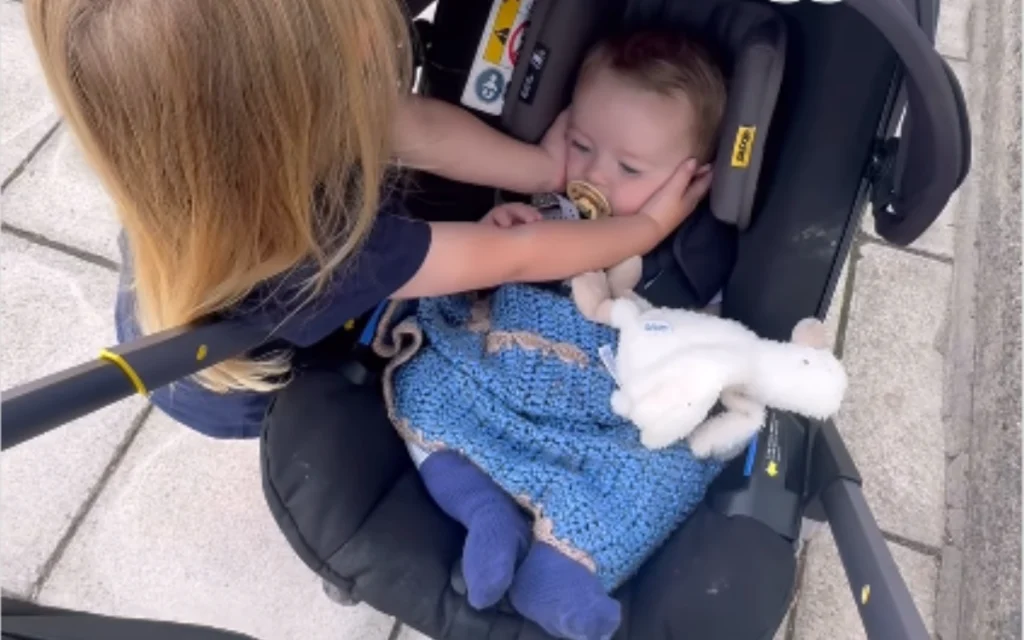A Mother’s Insight: When Autism Reveals Extraordinary Empathy
In a touching moment captured on video, three-year-old Zali instinctively covered her nine-month-old brother Ziggy’s ears as they navigated the noisy streets of County Durham in the U.K. Their mother, Bekah Cook, documented this spontaneous act of care on her Instagram account @bekahzneurolife, offering a window into the often misunderstood world of autism. “The sound of traffic was loud,” Cook explained, “and I suspected it might be a sensory trigger.” Without prompting, little Zali reached over to protect her baby brother, explaining simply, “It’s too loud, the noise.” This brief interaction revealed something profound about neurodivergent experiences – that heightened sensitivity, often viewed as a challenge, can manifest as extraordinary empathy and awareness of others’ needs. Instead of being consumed by her own discomfort, Zali’s first instinct was to shield her brother from what she perceived as painful stimulation, demonstrating a level of compassion that moved her mother deeply.
Zali’s autism presents in various ways that shape her daily experience. In unfamiliar environments or around strangers, she often becomes non-verbal – a response rooted in anxiety rather than disinterest. Her sensory sensitivities extend beyond noise to include tactile discomfort, leading her to wear the same comfortable clothing daily, as other fabrics become unbearable against her skin. Additionally, Zali experiences Pathological Demand Avoidance (PDA), a profile of autism characterized by heightened anxiety around everyday demands and requests. Even seemingly simple suggestions, like wearing noise-canceling headphones, can trigger overwhelming stress responses – creating a double-bind where the very tools that might help with one sensory issue create another. This complex interplay of sensitivities means that navigating the world requires constant adaptation and understanding from those around her.
Cook’s unique perspective as both mother and fellow neurodivergent individual provides invaluable insight into her daughter’s experience. Diagnosed with autism, PDA, and dyslexia herself, Cook also manages several physical conditions including fibromyalgia and hypermobility syndrome. This firsthand understanding of neurodivergent experiences has shaped her approach to parenting and advocacy. Cook began documenting her family’s journey after deciding to homeschool her eldest son, Ezra, when traditional schooling proved challenging for him. What began as personal therapy – a way to process experiences and track changes – evolved into a platform that resonates with others navigating similar paths. “Over time, I realized that what I was sharing offered valuable insight for others, too,” she explained, highlighting how personal vulnerability can create community understanding.
The relationship between Zali and baby Ziggy demonstrates the remarkable emotional intelligence that can accompany neurodivergence. Despite being only three years old, Zali displays an intuitive understanding of her brother’s needs that goes beyond typical toddler awareness. “She’ll sing his favorite song or give him his dummy when he’s upset—all without being asked,” Cook observed. This natural responsiveness challenges one of the most persistent misconceptions about autism – that autistic individuals lack empathy. “That couldn’t be further from the truth,” Cook emphasized. “Zali’s deep emotional connection and instinct to protect Ziggy is one of the most beautiful displays of empathy I’ve ever witnessed.” Her observation aligns with growing research suggesting that autistic individuals often experience intense empathy but may express it differently than neurotypical peers, sometimes feeling others’ distress so acutely that it becomes overwhelming.
Witnessing Zali’s protective gesture toward Ziggy evoked complex emotions for Cook. While feeling awe at her daughter’s compassionate response, she also experienced sadness knowing that such sensory discomfort is Zali’s daily reality. “I know from personal experience how painful noise can be and how vulnerable it can make you feel,” Cook reflected, drawing from her own autistic experience. There was also worry that her young child already felt responsible for protecting others from sensory challenges she herself understands all too well. This reality is shared by many families – CDC statistics indicate approximately 1 in 31 eight-year-old children have some form of Autism Spectrum Disorder. Each of these children navigates a world that often feels overwhelming, yet many develop remarkable coping strategies and forms of connection that go unrecognized by those unfamiliar with neurodivergent experiences.
Cook hopes her documentation of these family moments raises awareness about the invisible nature of many neurodivergent experiences. The ordinary-looking trip to a thrift store that revealed Zali’s extraordinary empathy exemplifies how autism often manifests in ways that casual observers might miss. “It’s crucial to spot the small things,” Cook advised, recalling her own experiences with dismissive attitudes, including a medical professional who once remarked, “Well, you don’t look autistic.” Such comments reflect persistent stereotypes that fail to capture the diversity of autistic expression. Through sharing her family’s journey, Cook emphasizes the expertise that parents develop about their own children’s unique needs and expressions. “Parents are the experts in their children,” she asserted. “Trust your gut.” In the gentle hands of a three-year-old covering her baby brother’s ears, we find a powerful reminder that autism doesn’t diminish empathy – in some cases, it might even enhance our capacity to recognize and respond to the vulnerabilities we see in others.














